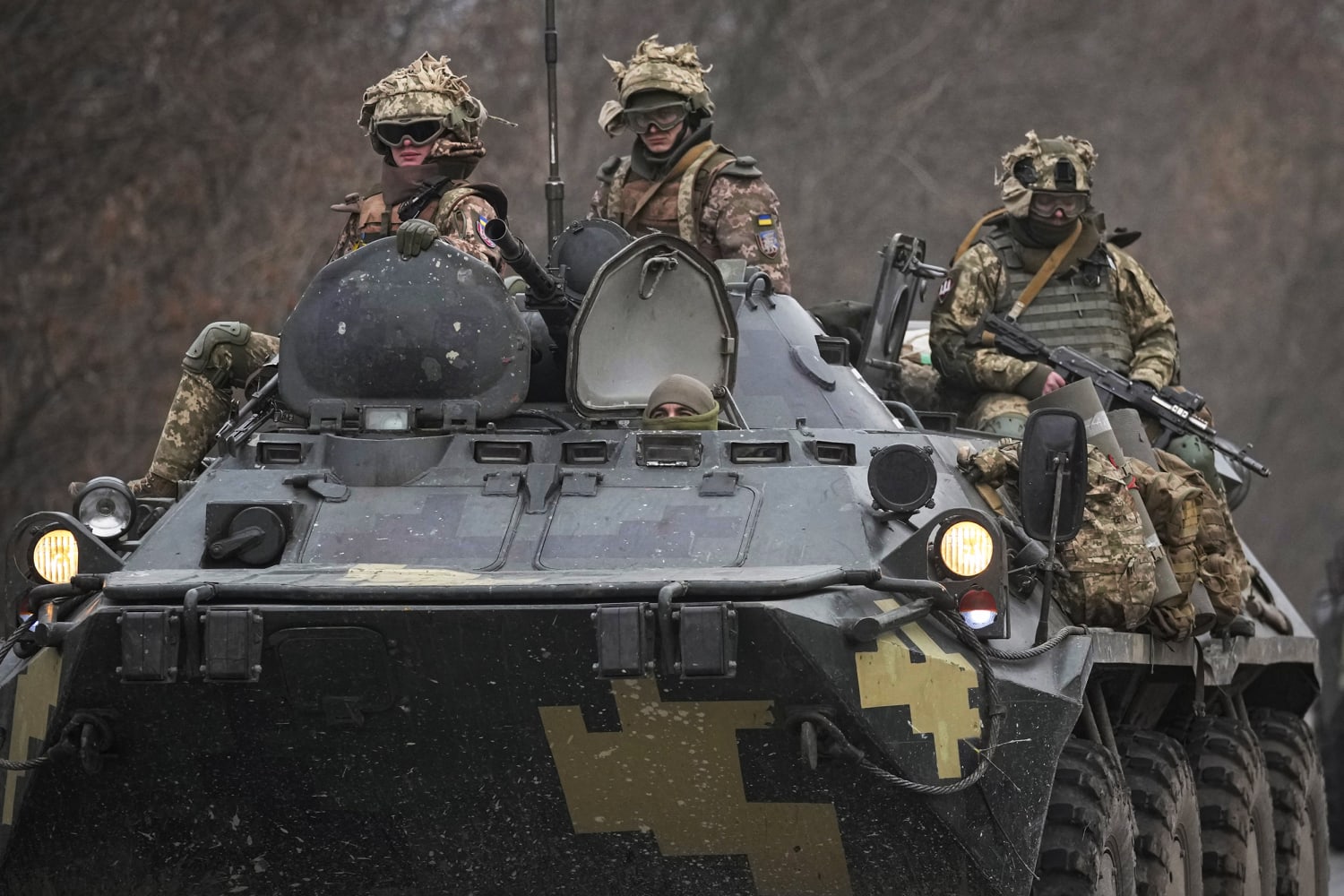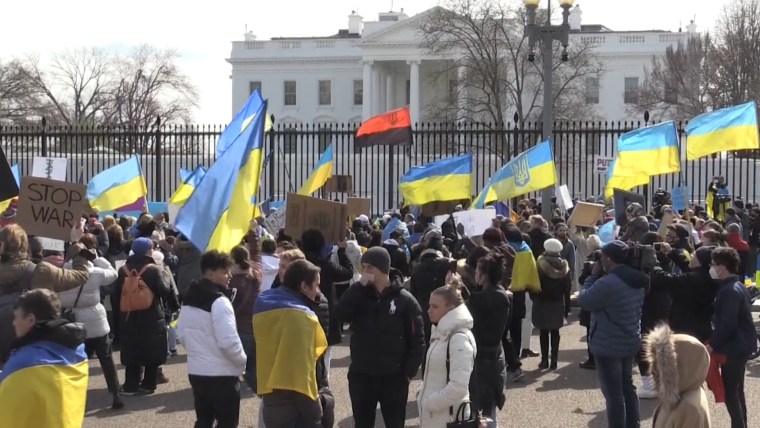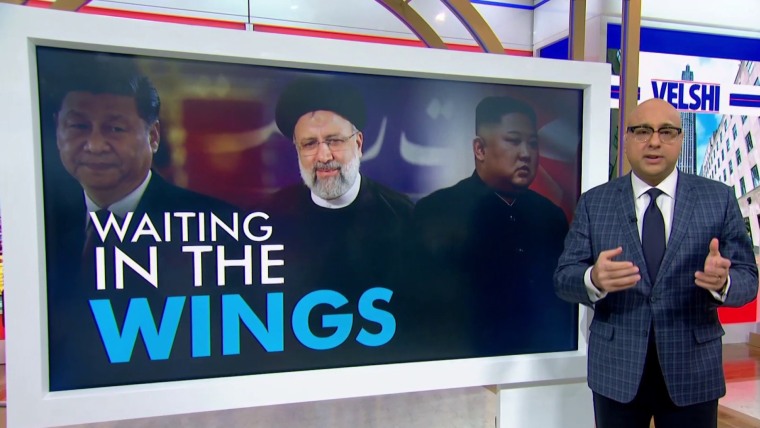Russia’s unprovoked attack on Ukraine began Thursday, after weeks of buildup. But the genesis of the crisis began much earlier, in October. President Joe Biden’s national security team presented him with grim details of President Vladimir Putin’s plan to invade. Political leaders on both sides of the Atlantic quickly raised the specter of the largest war on the European continent since the end of World War II.
The Berlin Wall has now been down far more years than it stood, and the Soviet Union disappeared more than 30 years ago.
And yet, in the fall of 2021, most Americans seemed unaware of or ambivalent to the impending danger. This is not surprising. Many Americans no longer remember the Cold War, the Russian invasion of Hungary and Czechoslovakia, or the Cuban Missile crisis. The Berlin Wall has now been down far more years than it stood, and the Soviet Union disappeared more than 30 years ago.
With a full-scale attack by Russian troops now ongoing, it’s important for Americans to understand why we should care about what happens to a country very few have visited or know much about. Simply put, the Russian invasion will have a real impact on American national security. And Washington’s support for Ukrainian democracy is our best guarantee against war — and for the continuation of peace. This is an attack on democracy, the rule of law and the values the United States has stood for throughout its history.
To understand why, you first must understand that democracy has been under “siege” for the past several years. Freedom House, which follows every country in the world, reported that global political freedom has declined every year since 2006. Last year, its report concluded, “the countries experiencing deterioration outnumbered those with improvements by the largest margin recorded since the negative trends began.” If Russia were to invade and occupy Ukraine, it would contribute markedly to this global recession.
Ukraine was recognized as an independent state by Russia more than 30 years ago. The Charter of Paris, signed in November 1990 by the United States, Russia and 30 European countries, established essential principles for a post-Cold War era based on international law and global norms. Subsequently, Russia, the United States and Great Britain guaranteed the sovereignty and territorial integrity of Ukraine in 1995 in the Budapest Memorandum.
Moscow has no more legal basis to insist on any portion of the territory of Ukraine than Germany has the right to demand the return of Alsace and Lorraine from France. If the West accepts such Russian claims, it will not only undermine the sovereignty of all countries but also invite other nations to seek territory through military force.
The American humorist and public commentator Mark Twain allegedly once noted that “history does not repeat itself, but it often rhymes.” In September 1938, Neville Chamberlain, Great Britain’s prime minister at the time, returned from a summit with Adolf Hitler in Munich. The German dictator had demanded that portions of Czechoslovakia become part of the Third Reich. Chamberlain acceded to Hitler’s demands. Upon his return to Great Britain, he proclaimed “peace for our time.”In fact, Chamberlain’s policy of appeasement resulted in the catastrophe of World War II.
Despite such clear historical precedents, polls suggest Americans have mixed feelings about how the United States should respond to Ukraine. Some Republican leaders have openly agreed with Fox News host Tucker Carlson, who has suggested we shouldn’t be picking sides at all. In an astonishing interview, former President Donald Trump praised Putin as a “genius.” Others argued Biden had not been tough enough on Moscow. Senate Majority Leader Mitch McConnell called for global unity, advising Biden that the “world is watching” how America and its allies respond to Russian aggression.
McConnell is correct. For one, the leaders of communist China are carefully watching how the United States and its allies react as Beijing considers its demands to control Taiwan and the South China Sea. Do we seek to live in a world guided by international law or the “law of the jungle,” where according to a famous quote attributed to Greek historian Thucydides, “the strong do what they can and the weak suffer what they must.” The West must decide to seek a “system of joint responsibility for security and peace” or accept “spheres of influence” like those created at Yalta in 1945, noted German Foreign Minister Annalena Baerbock.
Meanwhile, Putin has been quite candid about his ultimate goals — and they extend well beyond the border of eastern Ukraine. In his annual address to the Russian people in 2005, Putin said the collapse of the Soviet empire “was the greatest geopolitical catastrophe of the 20th century.” Western leaders shrugged off these remarks as a political polemic, but it now seems clear the Russian leader believes his own mythology.
As a result, he has pursued a three-pronged strategy. First, undermine American leadership and liberal democracy in general. Putin, and Xi Jinping in China, have both expressed a shared belief that liberal democracies are in decline and that now is the time to accelerate their demise. Second, drive wedges between the United States and its NATO allies in order to destroy the alliance. Third, reassert Russian control over countries that comprised the Soviet Union, especially those with large Russian-speaking populations characterized as “the near abroad.”
To be clear, there is already an ongoing, albeit often quiet, effort by Putin to achieve these goals. Ukraine is only one more data point in a long pattern of behavior that includes alleged interference in American and European elections and possibly even the Brexit vote in the United Kingdom. For years, there have been report of Putin ordering the assassination of Russians living outside Russia. In 2008, Putin ordered an invasion of Georgia and seized two provinces — South Ossetia and Abkhazia — where he established puppet governments. And in 2014, Putin directed the invasion of Ukraine and the seizure of Crimea after the Maidan Revolution deposed a Moscow-friendly president. He also fomented a rebellion in eastern Ukraine that has resulted in the deaths of more than 14,000 Ukrainians in the past eight years.
Putin’s claims that Ukraine poses a military threat and is historically part of Russia are clearly preposterous. The Lithuanian prime minister aptly described such analysis as beyond Orwell and Kafka. Putin does, however, fear that Ukraine might become a successful democracy and market economy. If that occurred, it would serve as an example to the Russian people that could ultimately threaten his control at home.
There is apparently an old Russian proverb that says if you dance with a bear, the bear decides when the dance is over. Putin will not change his aims. Even if the current crisis should end peacefully, he will continue to pursue these goals and strategy. Consequently, our collective response to Putin’s actions must reflect our vital national security interests. These include fulfilling our commitments to NATO, supporting global democracy and upholding international law. The United States, our NATO allies and other democratic states are in this fight together.
NATO is a key part of this, because it remains a cornerstone of American national security policy in Europe and globally. NATO was essential to American national security strategy in the aftermath of World War II. This was the basis for the Pax Americana that provided enormous benefits. Living standards have improved dramatically, and warfare has decreased. By the start of the 21st century, deaths due to armed conflict had sunk to the lowest levels in recorded human history.
Unfortunately, Trump damaged our allies’ faith in the United States to fulfill its obligations to international peace and security. He frequently criticized European leaders, questioned the value of NATO, threatened to withdraw the United States from the alliance and suggested America might not live up to its commitments. The Biden administration’s chaotic withdrawal from Afghanistan (a NATO mission) further frayed our credibility.
Many Americans today remain unaware that our NATO allies voted to support the United States following the terrorist attacks of September 11. Our European allies fought and died along American forces in Afghanistan.
Now, once again, American values, principles and national security are at risk. Experts suggest that a full-scale invasion could lead to 50,000 civilians dead, as well as tens of thousands of Russian and Ukrainian soldiers. We could soon witness 1 million to 5 million refugees fleeing into Poland, Romania or Hungary. Unlike what Tucker Carlson or Trump have said, this conflict may be geographically distant, but its consequences could have ripple effects that extend far beyond Eastern Europe. Americans must recognize that this crisis is not about Putin. It is about us.
Source: | This article originally belongs to Nbcnews.com












